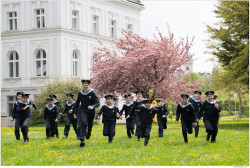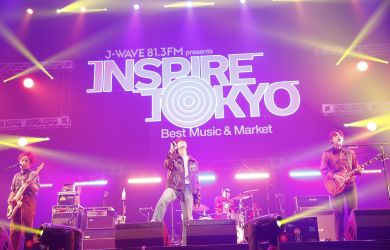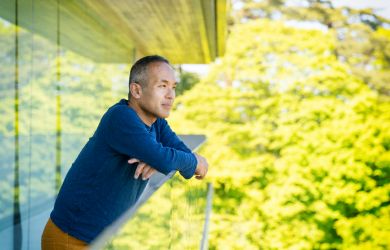
Originally published on metropolis.co.jp on September 2011

Yeah, that’ll happen
- The former director of the US government’s Japan Affairs Office demanded that Kyodo News retract an article that quoted him as saying the Japanese are “masters of manipulation and extortion.”
- The agriculture ministry said Japan will seek UNESCO World Heritage status for kaiseki cuisine.
- The government is considering an across-the-board pay cut of 5-10 percent for nationally elected politicians. The scheme would net ¥290 billion, to be used for disaster relief.
- Headline of the Week: “Mosses and Sea Slugs Offer Comfort in Difficult Times” (via The Asahi Shimbun)
Here & There
- A nationwide survey found that residents of Okinawa and Kyushu are the unhealthiest in Japan.
- Two 17-year-olds in Osaka were arrested for using a rubber rope to clothesline a 70-year-old man on a bicycle.
- A team of Japanese and Italian scientists used gene therapy to successfully treat a mouse with muscular dystrophy. The researchers are hopeful that the method will be able to help humans with the disease.
Here we go again
- A tsunami warning was issued after a magnitude 6.8 quake struck off the coast of northeastern Japan, but no big waves appeared and no one was hurt.
- A wild boar caught in the mountains of Miyagi was found to contain unsafe levels of radioactive cesium.
- A 35-year-old Nishi-Tokyo man was busted for fraud after it was discovered that he stayed at a Chuo-ku hotel for a month for free by posing as a victim of the March 11 disaster.
- A 75-year-old Kawasaki man who was waiting for an air conditioner to be delivered to his apartment collapsed and died of heatstroke during last month’s heat wave.
Sic transit
- An automotive industry group has found that the number of cars owned by Japanese households dropped for the fifth year in a row. The new figure is 1.075 vehicles per household, with residents of Fukui having the most cars (1.748) and Tokyoites the fewest (0.484).
- Softbank announced it will release an Android-based phone that comes pre-loaded with 13 Yahoo!-related apps.
- Some good news has come out of the intense summer heat—sales at convenience stores in July surged 9.5 percent compared to a year earlier thanks to brisk trade in items such as soft drinks and cold noodles.
Powering up
- The outgoing director general of the Swedish Energy Agency was tapped to take charge of Softbank’s ¥1 billion green energy fund.
- Japan and Jordan inked a deal that would see Japan export nuclear reactors for civilian use in the Middle East.
- A Jiji Press poll found, unsurprisingly, that 85 percent of Japanese people favor wind, solar and geothermal power sources, while just 21 percent back nuclear energy.
- The government is requiring automakers to boost the fuel economy of their vehicles by a whopping 24.1 percent by fiscal 2020.
Troubled waters
- A 10,000-ton container ship registered to a company in the Netherlands rammed into the wall of a seaside park in Kobe’s Akashi Strait.
- A former aide to late South Korean President Roh Moo Hyun revealed that his boss ordered “maritime police to smash into Japanese vessels if they approached a pair of South Korea-controlled islets” in the Sea of Japan.
- Meanwhile, Suntory restored the name “Sea of Japan” to a map on its website. The site had earlier referred to the body of water as the “East Sea,” which is the designation favored by Korean nationalists.
- A new maritime transportation route across the Sea of Japan (or East Sea, or whatever…) is “boosting hopes for stepped-up trade between Japan and China.”
This mortal coil
- One person died and several others were injured when a tornado struck northern Kyushu and Yamaguchi.
- Complaints about a “strange smell” led police to the grisly discovery of a decomposing body inside a car in a supermarket parking lot in Kyoto.
- Meanwhile, two Japanese men in their 50s were found with their hands and feet bound in a hotel room in Malaysia. One of the men died in what is believed to have been a robbery gone wrong.
Foreign intrigue
- The defense ministry is considering buying municipal land on Yonaguni Island as part of its five-year plan to “beef up the presence of Ground Self-Defense Forces” in Japan’s remote southwest.
- The Japan Tourism Agency has joined forces with Keidanren and the National Governors’ Association in an effort to boost the number of foreigners visiting the country.
- South Korea has established a new postal address system for every single office building, apartment block and house in the country, abandoning the system that was originally instituted in 1910 during Japan’s colonial occupation.
- Japanese astronaut Satoshi Furukawa chatted with kids from three quake-hit prefectures while aboard the International Space Station.
And finally…
- Moody’s Investors Services cut Japan’s government bond rating from Aa2 to Aa3, causing then Finance Minister Yoshihiko Noda to stick his tongue out and say, “I know you are but what am I?”
- What Noda actually said, according to AFP, was, “The smooth sales of Japanese government bonds at recent auctions show that confidence remains unshaken.” So there.
- Bottom Story of the Week: “Beloved Ginza Mama-san to Teach About Women’s Lifestyles at College” (via The Mainichi Daily News)
Compiled from reports by AP, Japan Today, The Japan Times, The International Herald Tribune, The Asahi Shimbun, The Mainichi Daily News, Daily Yomiuri, AFP, Reuters and Kyodo





